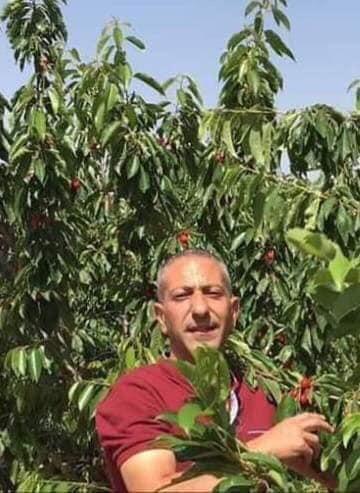
Samer al-A’reed, 44-year-old husband and father to two daughters and one son currently suffers from a serious health deterioration due to torture and ill-treatment during interrogations. Samer now is at Hadassah hospital.
On Wednesday, 25 September 2019, a special unit of the Israeli occupation forces arrested Samer al-A’rbeed. During the arrest Samer was harshly beaten by the Israeli forces using their guns. He was then taken to al-Mascobiyya interrogation center in Jerusalem and was issued an order that bans him from meeting his lawyer.
The following day on 26 September 2019, Samer had a court session without his lawyer. Though, according to the session’s protocols Samer stated to the judge that he suffers from severe pain in his chest and added that he cannot eat anything and throws up continually. We have no information of why Samer was not transferred immediately to the hospital and in fact his interrogation continued using torture and ill-treatment techniques that we are not aware of until this moment. Yesterday evening, 28 September 2019, the Israeli intelligence department, in a statement released to the press, stated that they have used extreme and exceptional techniques in interrogations that actually amount torture.
On Saturday, 28 September 2019, at around 8:00 pm Addameer’s lawyer was informed by a phone call from one of the interrogators at al-Mascobiyya that Samer was transferred to Hadassah Hospital – El-Esawya. The lawyer was also informed that Samer’s health is in critical situation, he is unconscious and on artificial respiration. Samer was in fact transferred to the hospital on Friday morning, 27 September 2019, though his family and lawyer were not informed of this fact.
Addameer’s lawyer immediately after the phone call tried to visit Samer, the attempts to visit him were only achieved after a few hours at around 1:30 am, as the lawyer was not allowed to actually visit Samer but to see him for a short period of time. According to the lawyer, Samer was unconscious, had several broken ribs, mark were all over his body, and he suffers a severe kidney failure.
The prohibition against torture in international conventions and agreements was unequivocal in its interpretation. The Geneva Conventions of 1949, as well as Protocol I and II of 1977, include a number of articles that strictly prohibit cruel treatment and outrages upon human dignity. In addition, torture is prohibited under the Convention against Torture and Other Cruel, Inhumane or Degrading Treatment or Punishment, which was adopted in 1948 and entered into force in 1978. The Convention against Torture states that no “exceptional circumstances whatsoever, whether a state of war or a threat of war” may be invoked as a justification of torture, thus establishing an internationally-recognized peremptory norm against torture even in compelling circumstances relating to counter terrorism. Furthermore, according to the Rome Statute, Articles 8, 7, torture amounts to a war crime and when systematic and wide-spread to a crime against humanity. Also, Article 55 of the Rome Statues prohibits in specific torture and ill-treatment of prisoners during investigation.
For further notice, Samer was arrested earlier on 26 August 2019. A few days later, on 29 August 2019, Samer had a court session at Ofer Court in order to examine the possibility to issue him an administrative detention order. During this session the judge issued a conditional release order for Samer, which included a 10,000 Shekels bail. However, the military prosecution requested to delay the implementation of the release order for 72 hours in order to appeal it. Instead of appealing the release order, the military prosecution issued a three-month administrative detention order against Samer on 2 September 2019. Later, on 9 September 2019, Samer had a confirmation of detention hearing, where the judge again issued him a release order and the military prosecution against requested to delay for 72 hours. Finally, a day after, on 10 September 2019, Samer was released based on the military prosecution’s order to release him without any conditions.
Israeli intelligence department issued a statement claiming that Samer and some other prisoners are allegedly involved in an attack on Ein Boben on 23 August 2019. It is worth noting that Addameer’s lawyer was not allowed to visit any of the other detainees as they were issued an order than bans them from meeting their lawyer from the first day of their arrest. However, according to the court session’s protocols all of those prisoners stated to the judge that they suffer from grave physical torture and also psychological torture mainly through arresting their family members continuously.
Addameer’s demands:
-
Addameer calls on the Israeli occupation authorities to immediately release Samer. Confessions taken under torture and ill-treatment are illegal and cannot be taken as evidence in court. Taking those confessions means the right to a fair trial is violated and thus the detention is arbitrary.
-
Addameer calls for the Israeli occupation authorities to instantly investigate the conditions and environment of torture Samer suffered from and to hold those responsible accountable to their crimes.
-
Addameer calls of the ICRC to from a medical committee with the purpose of investigating the crime of torture and ill-treatment.
-
Addameer calls on the UN Secretary General and the rest of the United Nationals committees and agencies to take all the required and available procedures and steps to end the Israeli practice of torture and ill-treatment in the Occupied Palestinian Territory. Additionally, to act immediately in actual attempts to hold the Israeli occupation authorities accountable to their crimes.
-
The lack of internal investigations for such grave human rights violations confirms the importance of third states to act upon their responsibilities as described by Articles 146 and 147 of the Fourth Geneva Convention to hold perpetrators of torture accountable.